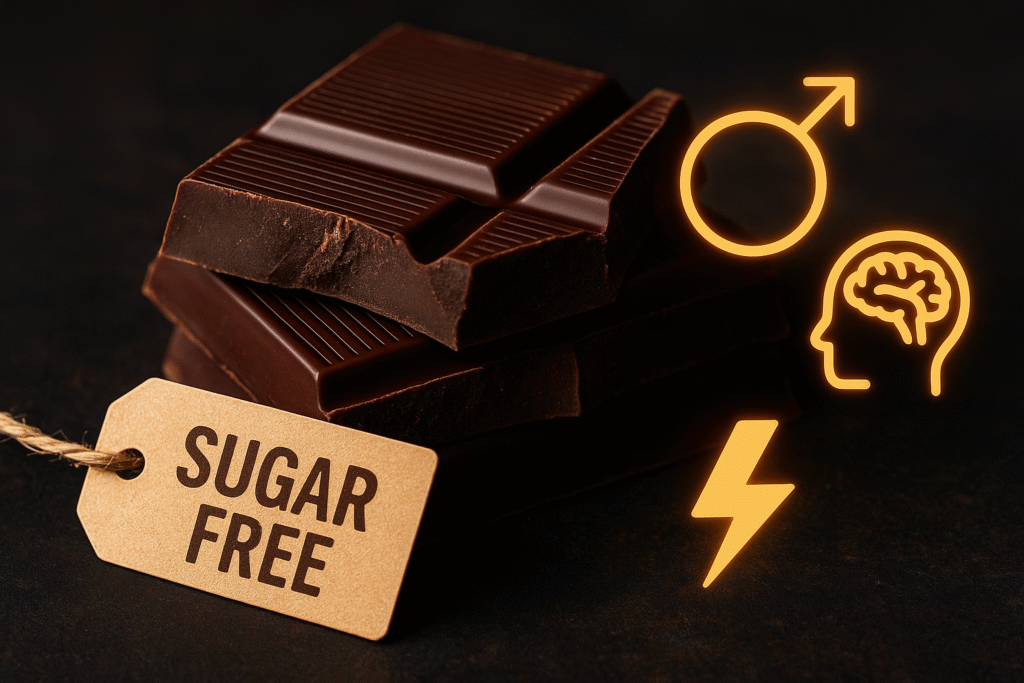Dark chocolate, especially sugar-free varieties, has gained attention as a powerful superfood. Beyond its rich flavor and indulgent appeal, research indicates that it can support testosterone levels, improve mood, and enhance energy. This article delves into the scientific evidence behind these claims and explores why sugar-free dark chocolate is a smart addition to a balanced, health-focused diet.
Lorem ipsum dolor sit amet, consectetur adipiscing elit. Ut elit tellus, luctus nec ullamcorper mattis, pulvinar dapibus leo.
Sugar-free dark chocolate is made from cocoa solids, cocoa butter, and non-sugar sweeteners such as stevia, erythritol, or monk fruit extract. It typically contains 70% or more cocoa content, providing a high concentration of beneficial compounds such as flavonoids, polyphenols, and essential minerals.
Key Nutrients in Sugar-Free Dark Chocolate:
Magnesium
Zinc
Iron
Copper
Antioxidants (flavonoids and polyphenols)
1. The Role of Magnesium
Magnesium is a crucial mineral that plays a vital role in over 300 enzymatic reactions, including those involved in hormone production.
Scientific Evidence: A 2011 study published in Biological Trace Element Research found that magnesium supplementation significantly increased free and total testosterone levels in both sedentary and athletic men. Sugar-free dark chocolate is a natural source of magnesium, providing around 64 mg per 28 grams (1 ounce).
Reference: Cinar, V. et al., (2011). Magnesium Status and Testosterone Levels. Biological Trace Element Research, 140(1), 18-23.
2. Zinc and Testosterone Synthesis
Zinc is directly involved in the production of testosterone and supports the function of the hypothalamic-pituitary-gonadal axis.
Scientific Evidence: A study in the journal Nutrition revealed that marginal zinc deficiency in men leads to a significant drop in testosterone levels. Supplementation reversed the decline, highlighting zinc’s vital role.
Reference: Prasad, A. S. (1996). Zinc: Role in Male Fertility and Testosterone. Nutrition, 12(5), 344–349.
Sugar-free dark chocolate provides small but bioavailable amounts of zinc, supporting natural hormone balance.
3. Antioxidant Protection and Hormone Health
Dark chocolate is rich in flavonoids like epicatechin, which have antioxidant and anti-inflammatory effects. Chronic inflammation and oxidative stress are known to suppress testosterone production.
Scientific Evidence: According to research in The American Journal of Clinical Nutrition, high intake of flavonoids from natural sources is associated with improved vascular health and hormonal regulation.
Reference: Cassidy, A. et al., (2012). Dietary Flavonoids and Circulating Sex Hormones. Am J Clin Nutr, 96(4), 884-893.
1. Influence on Serotonin and Dopamine
Cocoa naturally boosts levels of neurotransmitters like serotonin and dopamine, which regulate mood and emotional well-being.
Scientific Evidence: A study in Nutrients (2013) indicated that cocoa polyphenols can influence positive mood states and reduce symptoms of depression and anxiety.
Reference: Pase, M. P. et al., (2013). Cocoa Polyphenols and Mood. Nutrients, 5(10), 4159–4173.
2. Phenylethylamine (PEA): The Love Compound
PEA is a natural compound found in cocoa that acts as a mood elevator and has been associated with feelings of pleasure and attraction.
3. Endorphin Release and Stress Reduction
Cocoa stimulates the brain to release endorphins, the body’s natural stress-fighting chemicals, enhancing relaxation and mood.
Scientific Evidence: Clinical trials have shown that regular, moderate consumption of dark chocolate reduces cortisol levels and enhances psychological well-being.
Reference: Macht, M., & Dettmer, D. (2006). Everyday chocolate consumption and positive mood. Appetite, 46(3), 332–339.
1. Caffeine and Theobromine Content
Dark chocolate contains small amounts of caffeine and higher levels of theobromine, a gentle stimulant that provides a smoother, longer-lasting energy boost without the crash associated with high-caffeine products.
2. Blood Flow and Oxygenation
Flavonoids in dark chocolate promote nitric oxide production, which improves blood flow and oxygen delivery to muscles and the brain, enhancing physical and cognitive performance.
Scientific Evidence: A study in The Journal of the International Society of Sports Nutrition found improved time-to-exhaustion in athletes consuming dark chocolate due to enhanced nitric oxide bioavailability.
Reference: Patel, R. K. et al., (2015). Dark Chocolate Increases VO2 Max. J Int Soc Sports Nutr, 12, 47.
3. Stable Blood Sugar Levels
Sugar-free formulations ensure that energy levels remain stable without the glucose spikes and crashes associated with traditional chocolate.
What to Look For:
Cocoa content: Aim for at least 70%
Sweeteners: Prefer natural alternatives like stevia or monk fruit
Additive-free: Avoid artificial ingredients, hydrogenated fats, and emulsifiers
Ethical sourcing: Look for organic or Fair Trade certification
Top Brands to Consider:
Lily’s Sweets
ChocZero
Hu Kitchen
Alter Eco
Green & Black’s (No Added Sugar line)
A serving of 20-30 grams (about 1 ounce) of sugar-free dark chocolate daily can offer health benefits without excessive calorie or fat intake. Balance with other sources of nutrients and physical activity.
Sugar-free dark chocolate is more than a guilt-free treat—it’s a scientifically supported superfood that can aid in testosterone production, enhance mood, and elevate energy. By incorporating high-quality dark chocolate into your routine, you support not only your palate but also your hormonal, emotional, and physical well-being.
Remember: As with all health strategies, moderation and quality are key. Choose wisely, and enjoy the benefits of this indulgent yet functional food.
Cinar, V. et al., (2011). Magnesium Status and Testosterone Levels. Biological Trace Element Research.
Prasad, A. S. (1996). Zinc: Role in Male Fertility and Testosterone. Nutrition.
Cassidy, A. et al., (2012). Dietary Flavonoids and Circulating Sex Hormones. Am J Clin Nutr.
Pase, M. P. et al., (2013). Cocoa Polyphenols and Mood. Nutrients.
Macht, M., & Dettmer, D. (2006). Chocolate Consumption and Mood. Appetite.
Patel, R. K. et al., (2015). Dark Chocolate Increases VO2 Max. J Int Soc Sports Nutr.

